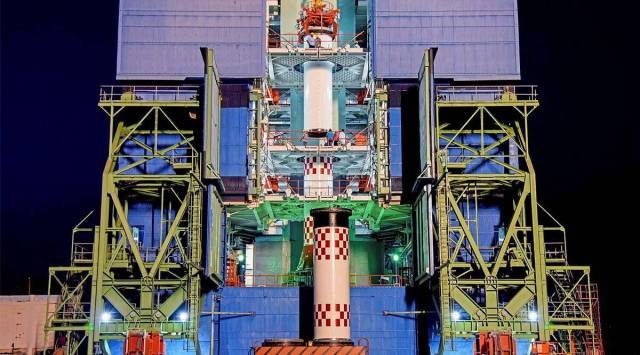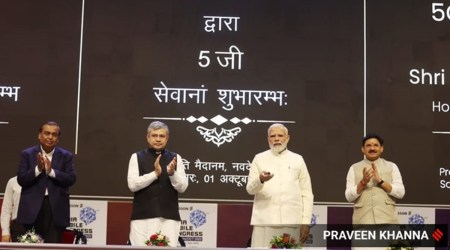- India
- International
Failure of maiden SSLV flight likely to affect US firm’s launch booking on ISRO rocket
In 2019, the SSLV received a commercial booking from US-based Spaceflight Inc in anticipation of the quick development of the rocket by ISRO. However, delays on account of the pandemic and the failure of its maiden flight may now result in Spaceflight Inc having to wait longer for its commercial launch.
 ISRO's Small Satellite Launch Vehicle mission ferrying an earth observation satellite and a student satellite before its launch. (PTI)
ISRO's Small Satellite Launch Vehicle mission ferrying an earth observation satellite and a student satellite before its launch. (PTI)Failure of the maiden flight of the Indian Space Research Organisation’s (ISRO) Small Satellite Launch Vehicle (SSLV) on Sunday is likely to further delay a launch that was booked on the SSLV rocket by US space launch services firm Spaceflight Inc.
The SSLV received a commercial booking in 2019 from Spaceflight Inc in anticipation of the quick development of the rocket by ISRO. However, delays in its development on account of the Covid-19 pandemic and the failure of its maiden flight on Sunday may now result in Spaceflight Inc – which has a booking on the second development flight of the SSLV – having to wait longer for its commercial launch.
“All the stages performed normally. Both the satellites were injected. But, the orbit achieved was less than expected, which makes it unstable,” ISRO said Sunday after the maiden development flight of the SSLV – the SSLV-D1 – did not inject two satellites in an intended circular orbit of the earth. The maiden SSLV flight was carrying an Earth Observation Satellite EOS-2 weighing 137 kg and an Azaadisat cubesat weighing 8 kg.
On August 8, 2019, Spaceflight Inc announced that it had clinched a deal with an ISRO commercial arm (New Space India Ltd) for using the second developmental flight of the SSLV rocket (SSLV-D2) to launch a spacecraft for an “undisclosed US-based satellite constellation” customer.
“SSLV is perfectly suited for launching multiple microsatellites at a time and supports multiple orbital drop-offs. We’re excited to add SSLV to our launch portfolio and manage many launches together — first to LEO (low earth orbit) mid-inclinations this year and SSO missions starting in the fall of 2020,” CEO and president of Spaceflight Curt Blake had said in 2019.

The SSLV is intended to cater to a market for the launch of small satellites into low earth orbits which has emerged in recent years on account of the need for developing countries, private corporations and universities for small satellites. The launch of small satellites has until now been dependent on `piggy-back’ rides with big satellite launches on ISRO’s work-horse, the Polar Satellite Launch Vehicle (PSLV), which has had over 70 successful launches. The launch of small satellites, as a consequence, has been dependent on the finalising of launch contracts for larger satellites by ISRO.
The new ISRO chairman S Somanath himself is credited with the design and development of the SSLV during his time as director of the Vikram Sarabhai Space Centre (VSSC) in Thiruvananthapuram since 2018. The launch of the maiden flight of the SSLV was scheduled for July 2019 before it got delayed.
The SSLV can carry satellites weighing up to 500 kg to a low earth orbit while the tried and tested PSLV can launch satellites weighing in the range of 1,000 kg. SSLV “is the smallest vehicle at 110-ton mass at ISRO. It will take only 72 hours to integrate, unlike the 70 days taken now for a launch vehicle. Only six people will be required to do the job, instead of 60 people. The entire job will be done in a very short time and the cost will be only around Rs 30 crore. It will be an on-demand vehicle,” former ISRO chairman K Sivan had stated in 2019 at the ISRO headquarters during an annual press conference.
Sivan had said in an industry meeting in 2019 that about 15 to 20 SSLVs would be required every year to meet the national demand alone. The development and manufacture of the SSLV is expected to create greater synergy between the space sector and private Indian industries – a key aim of the space ministry. Indian industry has a consortium for the production of PSLV and should come together to produce the SSLV as well once it is tested, ISRO has stated in the past.
One of the aims of the newly created ISRO commercial arm New Space India Ltd (NSIL) is to use research and development carried out by ISRO over the years for commercial purposes through Indian industry partners. “Manufacturing and production of Small Satellite Launch Vehicle (SSLV) and Polar Satellite Launch Vehicle (PSLV) through technology transfer,” is one of the mandates of the new firm. There are more than 500 industries contributing to ISRO programmes at present, and more than half of the project budget outlay for space programmes flows to these industries.
Apr 26: Latest News
- 0118 hours ago
- 0220 hours ago
- 037 hours ago
- 0420 hours ago
- 0520 hours ago































